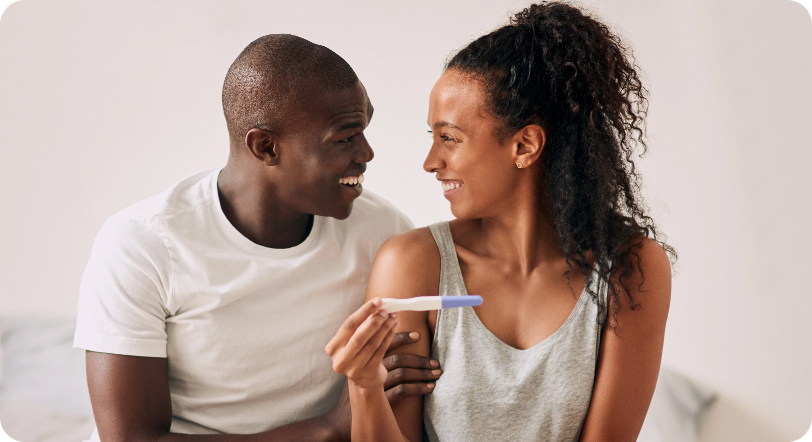Determine your most fertile days and increase your chance of conceiving.
The first day of your last period
Cycle Length
What is Ovulation?
Ovulation is when a mature egg is released from one of the ovaries and pushed down a fallopian tube.1 If the egg is fertilized by a sperm cell while it’s in the fallopian tube, you can become pregnant.1 If the egg makes it to the uterus without being fertilized, the uterine lining, egg, and blood will be shed in a process known as menstruation.1
When Does Ovulation Occur?
Ovulation typically occurs in the middle of a woman’s cycle. Since menstrual cycle length varies from person to person, the date of ovulation likewise varies, but in general it takes place two weeks before your next period. If a typical woman’s cycle lasts for 28 days, ovulation will likely occur around day 14.2 Most women experience ovulation between day 11 and day 21 of their cycle, when measuring from the first date of their last menstrual period.1
The ovulation cycle can be divided into two distinct phases:1
The ovulation cycle can be divided into two distinct phases:1
- Follicular. This is a developmental stage that begins on the first day of a woman’s period and continues until day 14 of a normal 28-day cycle.2 The follicular phase can differ dramatically from woman to woman and can last anywhere from 7 to 40 days.1
- Luteal. This stage is from the moment that the egg is released from the ovary until the first day of a woman’s period. This phase has a much more precise timeline and is usually only 12 to 16 days from the date of ovulation.1 Conception can occur during this phase, so understanding the timeline can be helpful for those who are trying to get pregnant.
How Long Does Ovulation Last?
Ovulation only lasts about 12 to 24 hours, as your mature egg begins its journey from the ovary to the fallopian tube.1,3 However, you can be fertile for up to six concurrent days within your menstrual cycle.3 An unfertilized egg only lives up to two days after ovulation, but sperm can live within your body for three to five days.3 If your goal is to conceive, it’s smarter to have sex before you ovulate, rather than after.3 This is why tracking ovulation can be so helpful. If you know when it’s due to happen, you can plan your intercourse accordingly, especially if you’re trying for a baby.
What Are the Signs of Ovulation?
Symptoms of ovulation include cervical mucus change, breast tenderness, cramps, and light spotting, amongst others. You may experience all these symptoms, some, or none at all—all of which is normal.
How Do I Start Tracking Ovulation?
A woman’s monthly menstrual cycle is measured as the amount of time between the first day of her period until the first day of her next period.1 While every woman’s cycle is unique, the average length is between 28 to 32 days and most women ovulate between day 11 and day 21.1
Using an ovulation calendar can help you to note the correlation between trackable physical changes and when ovulation occurs. This will help you predict when you are the most fertile and when ovulation will occur for you. Using an ovulation calendar can also help you better understand your body and your menstrual cycle, especially if you’re looking to boost your fertility. Knowing when your ovulation occurred can also help you more accurately predict your baby’s due date.
Using an ovulation calendar can help you to note the correlation between trackable physical changes and when ovulation occurs. This will help you predict when you are the most fertile and when ovulation will occur for you. Using an ovulation calendar can also help you better understand your body and your menstrual cycle, especially if you’re looking to boost your fertility. Knowing when your ovulation occurred can also help you more accurately predict your baby’s due date.




